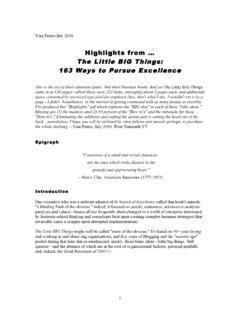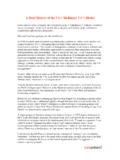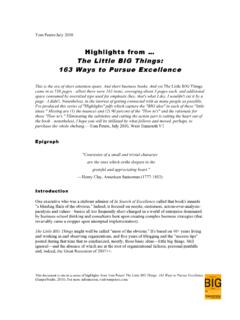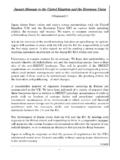Transcription of Getting Weird Design The Heart Boss- In Work …
1 PursuingUnboundWeirdWomenRoarWorkGetting Weird & StayingWe are Brawlwith No Rulesin a The New Economy s Hidden ImperativeThe MattersCreating & Maintaining the High Standard Deviation EnterpriseTa l e ntDesignHow to find it. How to keep of "Corporate Soul" & Basis for Competitive Advantage?of BrandingThe WebWorld2001 The 100% !Who Are We?What s Our Story?Why Are We Here?How Are We Unique?Does It Make a Dramatic Difference?Who Cares? Boss- FreeImplementationof STM/Stuff That Matters!*I thinkPSFThe [TOTAL] Victory of the Professional Service Firm*of Excellence:DifferenceThe Death Knell for Ordinary :WrongWe've Got It DangerouslySearchA Three-Generation Report CardInHeartEducationand 3rd Millennium Work:Tom PetersTom PetersTom PetersTom PetersTom PetersTom PetersTom PetersTom PetersTom PetersTom PetersTom PetersTom PetersTom PetersTom Peters' Manifestos 2002: The BRAWL WITH NO RULES SeriesTom Peters' Manifestos 2002: The BRAWL WITH NO RULES SeriesTom Peters' Manifestos 2002: The BRAWL WITH NO RULES SeriesTom Peters' Manifestos 2002: The BRAWL WITH NO RULES SeriesTom Peters' Manifestos 2002: The BRAWL WITH NO RWITH NO RULES SeriesTom Peters' Manifestos 2002: The BRAWL WITH NO RULES SeriesTom Peters' Manifestos 2002: The BRAThe BRAWL WITH NO RWITH NO RULES SeriesTom Peters' Manifeters' Manifestos 2002.
2 The BRAWL WITH NO RWITH NO RULES Series Tom Peters' Manifestos 2002: The BRAWL WITH NO RULES Series Tom Peters' Manifestos2002: The BRAWL WITH NO RULES Series Tom Peters' Manifeters' Manifestos 2002:estos 2002: The BRAThe BRAWL WITH NO RWITH NO RULES SerULES SeriesTom Peters' Manifeters' Manifestos 2002:estos 2002: The BRAThe BRAWL WITH NO RWITH NO RULES SerULES SeriesTom Peters' Manifestos 2002: The BRAWL WITH NO RULES Series2 Copyright material for electronic edition:In Search of Excellence: A Three-Generation Report Card. Copyright 2001 by Excel/A California edition published by Tom Peters Company Press. For information, address SelectBooks, Inc., New York, New rights reserved.
3 Published in the United States of America. No part of this book may be used or reproduced inany manner whatsoever without the written permission of the EditionISBN 1-59079-012-XFor more of Tom s ideas, visit bring Tom s ideas into your organization, visit We are in a brawl with no rules. Paul Allaire, former CEO, XeroxMANIFESTO. The word suggests a pointed view. (Rodale s Synonym Finder: Manifesto ..Proclamation. Declaration. Pronunciamento. Broadcast. Airing. Broadside.) And Pointed View is precisely the idea of this series of booklets in what we call The BRAWL WITH NORULES Series. Each booklet is an expanded chapter of my cornerstone day-long seminars. But Ihave chosen these topics for two particular reasons. First, I think they (1) are important and (2)present enormous opportunities and (3) are grossly neglected by most organizations. Second, Ihave a Radical Point of View about each one; you will find no half-way suggestions here! In Search of Excellence: A Three-Generation Report Card Almost 20 years ago, on 15 October 1982, In Search of Excellence was published to absolutely no notice.
4 America was in the tank. Inflation, 10%. Interest rates (prime), 20%. Unemployment, 10%. But that gets ahead of the story line .. 1966: I Get the Bug. I know exactly where my fascination with management came from. And it came quick as, in effect, a platoon commander of a construction detachment, in the Navy Seabees. 1966. 1967. Da Nang. I Corps. Vietnam. I did well. And was promoted .. put in a staff position in the Pentagon. I wasn t turned off by it. I was turned on by it. Turned on, in fact, by both experiences. I was fascinated by organizations. Why some groups did things incredibly well. And others, faced with apparently similar circumstances and staffed with similar people, didn t. And then I went to Palo Alto. To Stanford to get an MBA. (Why? Simple. Because everybody was doing it in 1970. I chose Stanford over Harvard because the application was due in January. The weather is better in Palo Alto than in Cambridge.) At Stanford I met the premier mentor in my life.
5 Gene Webb. A fellow traveler. Intrigued. Fascinated. By organizations. 1976: McKinsey s Little Project. Morph again. 1973. Worked in the White House .. on drug abuse issues. The boss (RMN) is fired. August 1974. So back West I go, to San Francisco and McKinsey & Co. A health glitch led to a sabbatical. And then a project, commissioned by the Big Bosses in New York. Strategy (get the plan right, and all else will follow) was the flavor du plus ans at McKinsey. And BCG. And every other consultancy. And yet McKinsey s new chief, Ron Daniel, thought there was more to life than just the right strategy. So he asked me to look into organizational effectiveness issues, particularly since I had just snared a in Organizational Behavior from the Stanford Business School. I wandered around. Talked to the experts. Sweden. Norway. England. Germany. The United States, too. And was fascinated by what I encountered. Because .. ALL OF IT .. contravened conventional wisdom. The way people (humans!)
6 Were organized and motivated .. not the Brilliance of the Strategic Plan .. was actually the primary determinant of the difference between winners and losers. Or, at least, that was my take. (It was a pretty wild idea in 1976.) 4 Bob Waterman, subsequently the coauthor of In Search of Excellence, bought my act. Big time. Became an avid student. We got into it. And given a whole series of coincidences not particularly interesting to anybody other than Bob and me we ended up talking about this excellence thing. And then pursuing excellent companies. In the book, we lay out the quantitative criteria that led us to the choice of those companies. Fact is, that was an after-the-fact decision to give us legitimacy. What we actually did was chat with the best and the brightest .. at McKinsey .. among our clients .. and asked them who was doing stuff right. Such was the true genesis of the 62 companies that we examined. Just as with the dot-com bubble of late, we got caught up with a few flavors-du-jour.
7 Atari comes to mind. (Whoops.) And I loved, loved, loved Wang Labs. (Whoops.) Yet, all in all, the 62 were a pretty interesting lot. They were a pretty damn good group of companies .. circa 1982. Pax Americana. Ah, yes, 1982 .. America won World War II. We didn t sacrifice the most bodies. The Russians did. And Churchill gave better speeches than Roosevelt. But our war machine starring the likes of Rosie the Riveter took us over the top. We produced more guns. More planes. More tanks. More trucks. More landing craft. We overwhelmed the Bad Guys with .. Industrial Might. Much more, truth be told, than with that well celebrated spirit and spunk of Iowa farm boys. (Not to take anything away from those Iowa farm boys.) American management. The alpha and the omega. And after World War II, our industrial enterprises went back to peacetime concerns .. and ruled the world. In the early fifties, we produced half the world s GDP. We were invincible. Our management practices were invincible.
8 The Harvard Business School, which had been around for a long time, but no more than a footnote, became The Training Ground for Captains of Invincible American Industry. A few chinks in the armor appeared. Sputnik. 1957. The Russians got into space before we did. It was a national crisis. It was pretty important, politically. Incredibly important, in terms of our psyche. And, perversely, it sent exactly the wrong message: Central Planning (Russian style) is Very Cool. In fact, Big Business had become pretty boring. (Wonderfully boring, to some extent.) John Kenneth Galbraith made that clear in his definer-of-the-age The Affluent Society. The six foot, seven inch Harvard economist said that America had pretty much gotten it nailed. The entrepreneurial crap was way behind us. We were now ruled by Brilliant Technocrats who oversaw Brilliant Machines. (Big Corporations.) Those Brilliant Machines churned out Lots of Goods. And the only real issue, according to Galbraith, close adviser to John F.
9 Kennedy, was how to usefully spend the profits on the arts. Little did he know .. 5 (Little has he known. Galbraith has gotten everything wrong. All the time. From the beginning. But that s another story. And I don t intend to vent in this paper. At least not much. No more than this.) An age of technocrats. An age of central planning. An age of mechanical organizations. And then .. 1980: Whoops! Japan got its shit together. Big time. Moved out of the devastation of World War II .. and reconstructed its Industrial Economy. And started to embarrass us. First it was shipbuilding. Then it was steel. Then it was automobiles. (Core of the American Psyche.) Then semiconductors. So now it s 1980. Yes, we got that man to the moon. Beat the hell out of the Russians. But in Detroit .. we d been whacked. The Japanese cars were .. Smaller .. Cheaper .. Better. (And the price of gas was running at about a buck a gallon. So smaller made a big difference. Those were the days when fuel economy was not a politically incorrect term.)
10 When awakened, Americans learn .. quickly. We did. My old friend Bill Ouchi, a Japanese-American, wrote a book called Theory Z. It did something that none of Peter Drucker s books have done. Made it to the New York Times Best Seller List. It said that the Japanese had gotten it right. They knew stuff about management that we didn t know. And it was important. And they were going to continue to kick our butt if we didn t get it. And then a couple of other of my friends, Richard Pascale and Tony Athos, wrote The Art of Japanese Management. Another best seller. They took the Ouchi message, and turned up the volume. There was a way to manage. And It Was the Japanese Way. And if you didn t get that .. you didn t get anything. In 1980. Even the bastion of by-the-numbers-management, the Harvard Business School, producer of Robert McNamara (aka Body Count Bob), chimed in. Two senior profs, manufacturing experts, Bill Abernathy and Bob Hayes, published an article in the house organ, The Harvard Business Review, Managing Our Way To Economic Decline.











